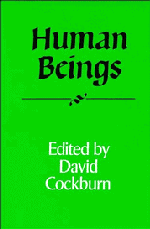Book contents
- Frontmatter
- Contents
- Introduction
- Machines as Persons?
- The Importance of Being Human
- Response to McNaughton
- Response to Diamond
- Real Selves: Persons as a Substantial Kind
- Personal Identity and Brain Transplants
- Personal Identity and the Idea of a Human Being
- Imagination and the Sense of Identity
- Radical Critique, Scepticism and Commonsense
- Getting the Subject back into the World: Heidegger's Version
- Incarnational Anthropology
- How Many Selves Make Me?
- Sartre and Our Identity as Individuals
- Bibliography
- Notes on Contributors
- Index
Real Selves: Persons as a Substantial Kind
Published online by Cambridge University Press: 05 February 2015
- Frontmatter
- Contents
- Introduction
- Machines as Persons?
- The Importance of Being Human
- Response to McNaughton
- Response to Diamond
- Real Selves: Persons as a Substantial Kind
- Personal Identity and Brain Transplants
- Personal Identity and the Idea of a Human Being
- Imagination and the Sense of Identity
- Radical Critique, Scepticism and Commonsense
- Getting the Subject back into the World: Heidegger's Version
- Incarnational Anthropology
- How Many Selves Make Me?
- Sartre and Our Identity as Individuals
- Bibliography
- Notes on Contributors
- Index
Summary
Introduction
Are persons substances or modes? (The terminology may seem archaic, but the issue is a live one.) Two currently dominant views may be characterized as giving the following rival answers to this question. According to the first view, persons are just biological substances. According to the second, persons axe psychological modes of substances which, as far as human beings are concerned, happen to be biological substances, but which could in principle be non-biological. There is, however, also a third possible answer, and this is that persons are psychological substances. Such a view is inevitably associated with the name of Descartes, and this helps to explain its current unpopularity, since substantial dualism of his sort is now widely rejected as ‘unscientific’. But one may, as I hope to show, espouse the view that persons are psychological substances without endorsing Cartesianism. This is because one may reject certain features of Descartes's conception of substance. Consequently, one may also espouse a version of substantial dualism which is distinctly non-Cartesian. One may hold that a person, being a psychological substance, is an entity distinct from the biological substance that is (in the human case) his or her body, and yet still be prepared to ascribe corporeal characteristics to this psychological substance. By this account, a human person is to be thought of neither as a non-corporeal mental substance (a Cartesian mind), nor as the product of a mysterious ‘union’ between such a substance and a physical, biological substance (a Cartesian animal body).
- Type
- Chapter
- Information
- Human Beings , pp. 87 - 108Publisher: Cambridge University PressPrint publication year: 1991
- 2
- Cited by

